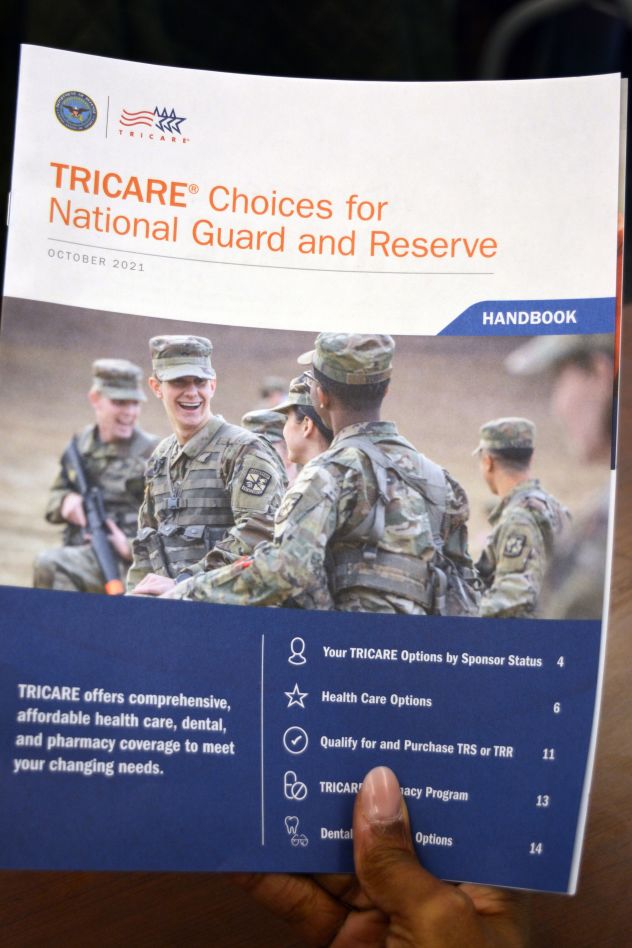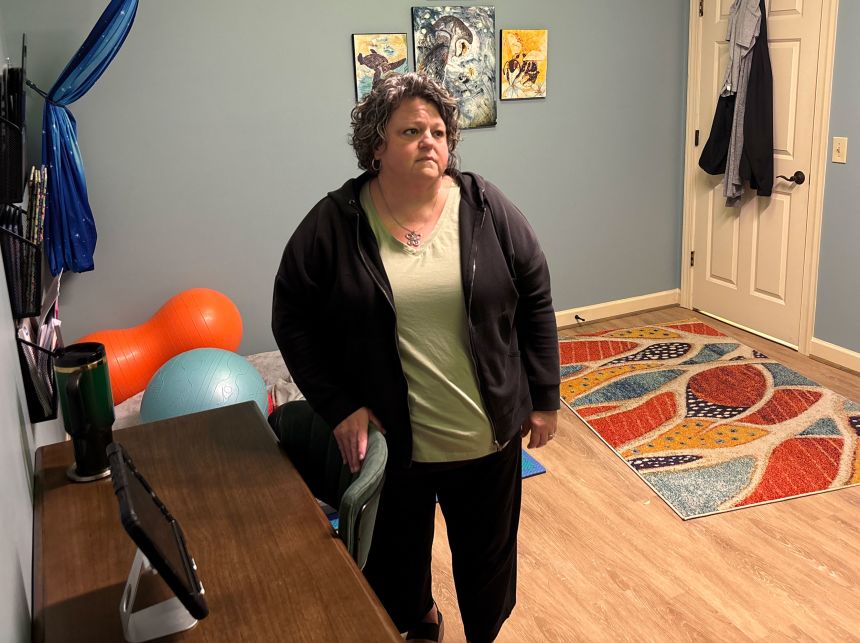Military families and heath care providers say insurance switchover has wreaked havoc and eroded trust | CNN
When Denise learned in February that she might have to pay out of pocket for her weekly therapy sessions, the military veteran from Virginia started to panic.
She’d been seeing her psychologist weekly in Norfolk for over a year and was finally making progress in resolving some buried trauma. Denise, who doesn’t want CNN to use her last name for privacy reasons, calls her therapist her “lifeline,” as she fears taking her own life if she can’t continue the care.
The therapist informed her that Denise’s insurance had stopped paying for her sessions. Denise uses Tricare, a military program that provides health insurance for active-duty service members, National Guard members, and many retirees — like Denise. It services about 9.5 million people.
Her therapist, flustered by the abrupt halt in reimbursements, said she sought to get payment for weeks — not only for Denise’s care but for all her other Tricare patients whose claims were suddenly going unprocessed as of January 1. Without success, she finally had to hold uncomfortable conversations, telling her patients in February that to stay afloat financially, she may need them to pay full price up front — or else pause their care until Tricare could start paying again.
“Panic. Absolute panic,” Denise told CNN, recalling how she felt when she heard the news. Her cost for therapy would increase from her copayment of $50 to roughly $200 per week if she had to pay out of pocket — a cost she couldn’t afford. “It scares me a lot. If I don’t have someone to lean on, it won’t end up well.”
Denise’s therapist, Dr. Libby Cutshall, has continued treating Denise for just the cost of her copayment. But she had to make the painful decision to pause care for about 30 other Tricare patients, as she couldn’t afford to stay in business without receiving reimbursement for their care.
Similar conversations happened in medical offices across the country when Tricare fell behind on reimbursing hordes of medical claims after major changes and technical glitches at the start of the year. This resulted in an avalanche of problems for both health care providers and patients, according to 37 providers and patients from 15 states who’ve shared their stories with CNN. They say those hit hardest were smaller outpatient clinics near military installations that operate on referrals and frequent appointments for mental health, speech therapy, physical therapy, and treatment for autism. For many, it’s caused life-altering financial stress and disruption in care.
Tricare is a complicated system, split between East and West regions, but it’s a mainstay for military families. It’s overseen by the Pentagon’s Defense Health Agency, and, like benefit packages at private companies, it offers various coverage plans for medical, dental, mental health, and prescription drugs. It also authorizes access to civilian networks of providers for those who need care outside of military hospitals or bases.

In the West, a new contractor, TriWest Healthcare Alliance, took over administering the health care program this year with its network of providers, adding to similar work it had done for the Department of Veterans Affairs. In the East, Humana Military continued the role it’s had as the region’s contractor for nearly 30 years but changed its claim processing partner. Six states moved from East to West, and the entire network had its annual Medicare rate update.
TriWest said some of the problems were caused by the previous contractor not sending provider information in a timely manner — a claim the previous contractor strongly denies. Humana Military said technical issues made it difficult to process claims, but those issues are now resolved and they’re working to clear the backlog.
Clinics in both regions reported missing reimbursements for months. In the West, many providers said they found themselves out of the network entirely in January and some are still trying to get recredentialed to return. Patients have had issues finding out if the same providers they saw last year are still in-network, or whether their appointments will be covered. Providers and patients alike have spent hours on the phone trying to get answers.
“It’s really halted my whole life,” said Shawn Manvell, the founder of Achievement Center for Therapy and owner of three large clinics — two in California and one in Nevada — that offer a wide range of therapies, with a special focus on treating people with autism. She said more than half of their patients come from Tricare families.
Manvell has received about $70,000 in reimbursement checks recently from TriWest, and another $100,000 in cash advancements that she’ll have to pay back. But she’s still owed an estimated $350,000, she said. To keep treating patients and employing her staff of nearly 30, she’s taken out $500,000 in high-interest loans, along with liquidating some of her own personal assets, she said.
Now five months into the year, progress has been made in both regions, but those who follow Tricare closely say the overall issues and their rippling effects still linger, creating trust issues with Tricare that could leave long-lasting ramifications.
Charlotte Cuestas, a 31-year-old military spouse in Florida, had been seeing a therapist for postpartum depression after a traumatic birth experience. She couldn’t afford the $200 per session out of pocket that her therapist was needing after lack of reimbursement from Humana Military, so Cuestas decided to suspend her sessions. “My fear is that it’s going to get to a point where no therapists are going to want to take Tricare at all because of this issue,” she said.
In several instances, providers near military bases who mostly serve Tricare beneficiaries say they have reduced the number of Tricare patients they’ll accept, have left the network entirely, or plan to close their practice — ultimately resulting in less access to care for active-duty military members, retirees, and their families.
Desperate for help, patients and providers made TikToks or took to military-centric Facebook and Reddit groups to post their experiences. Mission Alpha Advocacy, a non-profit group that focuses on military families with special needs, says it heard from nearly 400 providers who’ve reported insufficient payment and over 500 families who’ve reported disruption in care.

Tricare has gone through turnovers and other hiccups in the past, but this one stands out, said John Letaw, a former Navy lieutenant commander who spends his retirement days helping people navigate the system.
“What we’re seeing this time is way beyond. It’s really inexplicable,” he told CNN in April. Letaw has written a book, “The Ultimate Guide to TRICARE” and runs a Facebook group with nearly 20,000 members, where he’s seen stories of struggle from patients who say they’ve been affected this year.
“It’s pretty catastrophic to a lot of military families,” he said.
Cutshall told CNN she continued treating four other Tricare patients, in addition to Denise, whom she described as her most vulnerable. She said she was too worried about the consequences if they had to suspend their sessions, and she feared they wouldn’t find care elsewhere amid the Tricare struggles.
“(Denise) is at risk for dying if she doesn’t have care. That’s not hyperbole,” Cutshall said of Denise. “She served in the military, and she should get that care — and she shouldn’t have to worry.”
Cutshall said she went nearly three months without receiving any reimbursement at her clinic near Naval Station Norfolk, the largest naval installation in the world. With 80% of her patients using the military benefit, her practice was hit hard by the disruption.
By her count, Cutshall said she’s still owed an estimated $30,000 by Tricare. She hasn’t paid herself at all this year, leaning entirely on her partner’s income at home, and she said she’s taken $20,000 from savings to help pay the three other therapists at her practice.
Since early April, with help from a Tricare representative, reimbursements have started trickling in for small amounts of $115 or $120 — a few as large as $600 — but the payments don’t explain which patients they cover, Cutshall said, so she has no way of reconciling her books.
She said she was getting five to 10 calls each day this spring from people seeking care — many of them active-duty military. But she’s had to turn them away, as she seeks to diversify and take clients who have other insurance coverage instead.
“It has changed the way that we deal with Tricare patients,” she said. “And that’s unfortunate because (they make up) so many people in our area, but we cannot continue to do this and sustain and help the people that we want to help.”
The gradual trickling in of reimbursement checks — one provider in Texas said one of her initial checks was for 63 cents — is a sign of progress for many, but it’s hardly relief for those who’ve been hit the hardest.
And for some, the lag in reimbursement has been completely insurmountable. On April 30, Elizabeth Brown-Miller closed her applied behavior analysis clinic for children with autism near Fort Cavazos in Texas. She said the “domino effect” created by a range of payment issues with TriWest this year was too crippling, and she’s now meeting with lawyers about possible bankruptcy and ways to avoid it.

“There’s no hope for us. There’s no way,” she said. “We have to shut down.”
When she opened the clinic in 2021, it was part of the East region with Humana Military. But Texas was one of the six states that migrated to the West this year, and while Brown-Miller’s clinic was still listed as in-network, her 16 therapists were suddenly out-of-network.
Billing became a nightmare, she said, and reimbursement payments weren’t coming through. She had to reduce pay for her therapists and cut back on services for her patients. To further maintain overhead and payroll, Brown-Miller said she took out $182,000 in high-interest loans, expecting the Tricare issues to be resolved soon. TriWest also sent her $70,000 in advance payments to help while they processed the backlog of her claims, she said, but she’ll have to pay that back.
In late April, after crunching the numbers, Brown-Miller decided she couldn’t sustain her business. She was in too much unexpected debt, a hole too deep to climb out.
“A lot of my parents (of patients) are angry. They’re upset. They’re sad. They’re grieving,” she said, growing emotional. “I feel like I failed them. And they tell me I didn’t. But at the end of the day, I did. Because I couldn’t keep my doors open for them.”
She said she reached out to 17 clinics in her area to see who was willing and financially able to take on her Tricare patients. Only four said they could.
Meanwhile, in the East, Natasha Lachapelle has been a speech therapist for 22 years and finally opened her own practice three years ago in the military town of Columbus, Georgia, near Fort Benning Army Base. About 95% of her patients used Tricare.
Six weeks into the new year, she emailed her clients to tell them that due to the lack of income from Tricare – she said she was owed thousands — she was cutting back her hours and taking a part-time position at a hospital instead. “It was an absolute cluster,” said Lachapelle.

As a small, solo practitioner who burned through her savings to deal with a cancer diagnosis last year, Lachapelle said she didn’t have enough money to keep afloat while she saw patients for free.
Humana Military had fully reimbursed her by mid-April, she said, but going months without payment and having to take on another part-time job simply became too much. She emailed her patients again on April 24, this time to say she was shutting down her practice by July, a decision she calls “excruciating.”
She said she feels so burned by Tricare that she can’t risk putting her financial future at stake.
“I can’t trust it,” she said. “I can’t trust it ever again.”
In a message to beneficiaries on March 26, David Smith, the acting director of the Defense Health Agency, which oversees Tricare, acknowledged that the new contractors have “experienced challenges” since January 1 and that beneficiaries and providers “are understandably frustrated” by the delays in payment processing.
Smith wrote that initial technical problems have been addressed and “claims payments are now being processed closer to required standards.”
As of mid-May, Humana Military has adjudicated 6.25 million claims in the East, totaling $1.3 billion, with fewer than 7% of its claims pending beyond 60 days, according to DHA officials and a Humana Military spokesperson. Meanwhile, TriWest has processed and paid more than 7.3 million claims, totaling $1.5 billion, with about 2.6% of its claims outstanding beyond 60 days, according to TriWest.
“We take our commitment to TRICARE East Region beneficiaries and providers very seriously, and apologize for the inconvenience and frustration this problem has caused,” a Humana Military spokesperson said in a statement. “Our priority is always TRICARE East Region beneficiaries and their ability to get access to care. We are working closely with impacted providers to ensure they continue to care for TRICARE East Region beneficiaries.”
In the West, a spokesperson from TriWest said in a statement: “All major health care transitions of this size and scale bring challenges, and while we are currently processing and paying out claims to providers, we recognize that even one provider who has not been paid in a timely fashion is too many.”
TriWest said “it’s making progress every week” and continues to improve processing times. A TriWest spokesperson also said the company hired hundreds of additional customer service staff to handle the massive influx of calls and complaints and reduce the hold time. Both regions said they’re placing a special focus on clinics that treat patients with autism.

With so many providers showing up out-of-network in the West, Tricare and TriWest have sought to assure military families that they don’t need to wait for TriWest approval if they’ve been referred by their primary care manager — usually a physician on base — to see an outpatient provider. Tricare has issued a blanket waiver for patients to reference.
David J. McIntyre, Jr., the president and CEO of TriWest, issued a letter to providers on April 29, apologizing for any disruptions at their practices and reiterated that Tricare patients don’t need approval from TriWest if they’ve been referred for outpatient care at their clinics. McIntyre also addressed the issue of providers being out of network, saying, “Tricare patients may continue to seek care from their existing providers, regardless of whether the provider has joined the TriWest network.”
But patients say they run into providers who don’t trust the waiver. “The problem is medical specialists are reluctant to take those waivers because they’re still not sure that they’ll ever be paid,” said one retired Marine and combat veteran in California, who asked not to be named for fear of retaliation.
He said he’s lost more sleep trying to resolve questions about his wife’s care than he lost during combat. After getting a partial mastectomy last year to remove a breast lesion, his wife is scheduled for several follow-up appointments with a variety of doctors this year. Her mother died of breast cancer, so it’s a top-of-mind concern for him and his wife. But they can’t get solid assurances that their appointments will be covered.
“The continual non-answers … they start to dominate your thoughts, your feelings. It increases anxiety, puts you on edge,” he said. “It makes you question your own service and sacrifices that you made.”
In Missouri, Danielle Gist was in her first trimester when she learned her obstetrician was no longer in network when TriWest took over. A military spouse who uses Tricare, Gist was suddenly getting large bills that she normally doesn’t get for maternal care.
At an appointment this month, now in her third trimester, she learned her obstetrician was finally back in network. The news “felt like a bit of weight off the shoulders,” she said, but the stress and anxiety of trying to get answers over the past few months still leave her nervous.
“It still feels really uncertain,” she said. “And I still have all the other bills to reconcile, so it’s still looming over me. It just feels overwhelming and exhausting, like a job I didn’t sign up for.”
Christy Collins, a military spouse in Kansas, said Tricare has usually worked well for her family. But this year, she’s spent hours trying to get an appointment scheduled for her 8-year-old daughter to be tested for autism and trying to get ADHD medications renewed for her 12-year-old daughter. She’s also seeking a referral for a breast cancer screening for herself but said she keeps getting the runaround after making multiple phone calls.
“I have a PhD, and I can’t manage to solve this,” she said.













